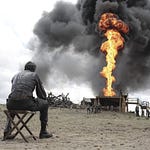On this week’s episode, Sonny Bunch (The Bulwark), Alyssa Rosenberg (The Washington Post), and Peter Suderman (Reason) try to figure out how this Vulture feature on the work that went into making Spider-Man: Across the Spider-Verse depicts an abusive workplace. Then they review Wes Anderson’s new film, Asteroid City, a movie about a fictional play anthologized on a fictional TV show set in a fictional town. (The essay collection Sonny mentions, Do Not Detonate Without Presidential Approval, is available from Penguin Random House here; he strongly recommends checking it out if you desire to learn more about the influences on the film.) Make sure to swing by Bulwark+ for a discussion of some of our favorite stage adaptations. And if you enjoyed this episode, share it with a friend!
The Perplexing Confection of 'Asteroid City'
Plus: 'Spider-Verse' took hard work to make great. Is that a controversy?
Jun 27, 2023
Across the Movie Aisle
Audio
Here's the elevator pitch: It's "Left, Right, and Center" meets "Siskel and Ebert." Three friends from different ideological perspectives discuss the movies and controversies (or nontroversies!) about them.
Featuring bonus Friday episodes exclusively for Bulwark+ members.
Here's the elevator pitch: It's "Left, Right, and Center" meets "Siskel and Ebert." Three friends from different ideological perspectives discuss the movies and controversies (or nontroversies!) about them.
Featuring bonus Friday episodes exclusively for Bulwark+ members.
Listen on
Substack App
Apple Podcasts
Spotify
Overcast
Pocket Casts
RSS Feed
Recent Episodes





















Asteroid City is a masterpiece. Thank you Alyssa.
Try Army journalist as a job to complain about! Four junior enlisted soldiers had to produce a 32-page tabloid every Friday, working in a post HQ where few enlisted members were available to rake leaves or shovel snow, so we did that. Our soldierly duties (physical training!) interfered as well. I was awake at 5, in the office at 6:30, and back to the barracks at 10 most Mondays to Thursdays. We didn't have the option to quit, either--our Public Affairs Officer and the sergeant in charge were helpful with a three-day pass and a shift in roles or duties from time to time. I treasure the memories, but I didn't re-enlist. I was paid roughly $1500 per month. But--we went above and beyond, we were tabloid of the year while the four of us were together, and it helped to hear soldiers and their families tell us ours was the only post newspaper they ever wanted to read.
I really enjoyed this movie, mostly because it turned what I thought was a past problem of Wes Anderson movies (and many other movies, don’t get me wrong), that women are mostly treated as objects, not subjects of the plot. Many of them were from the distinct point of view of the male main character so this isn’t terribly odd. But in this movie this is turned on it’s head when the starlet (Johannson) and the nameless dead wife/actress (Robbie) have some of the most profound insights and importance in the movie. Also, the little girls, who are largely ignored and left to their own devices, have some of the most important emotional scenes and power (they leave their mother’s Tupperware buried at the motor lodge) to appease them. Meanwhile, the male lead is really too lost and confused to deliver these epiphanies. It’s an interesting turnabout. I think it’s because all these minor characters have amazingly important parts. It’s an astonishingly efficient movie, except the first act was slow. Thanks for the podcasts. Always enjoy them.